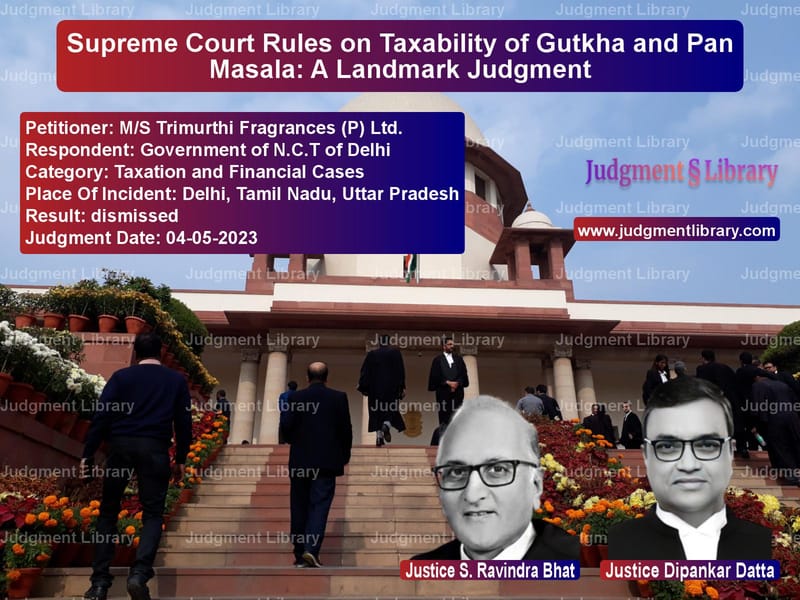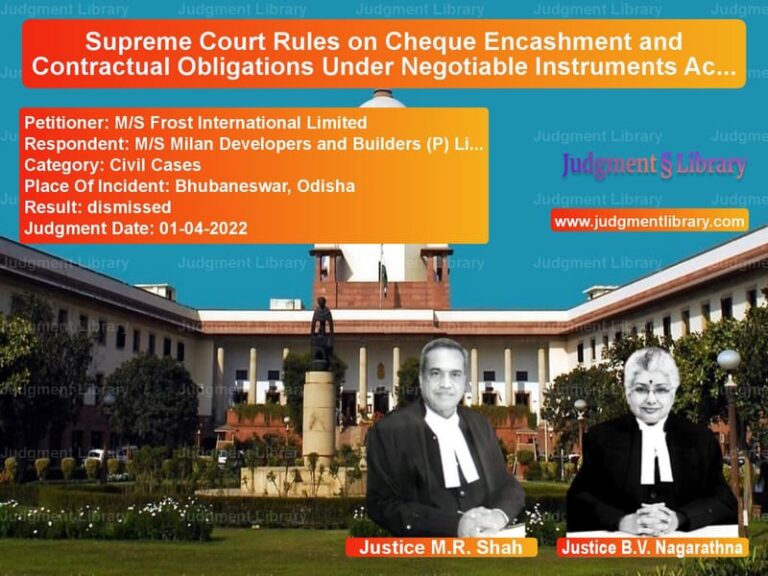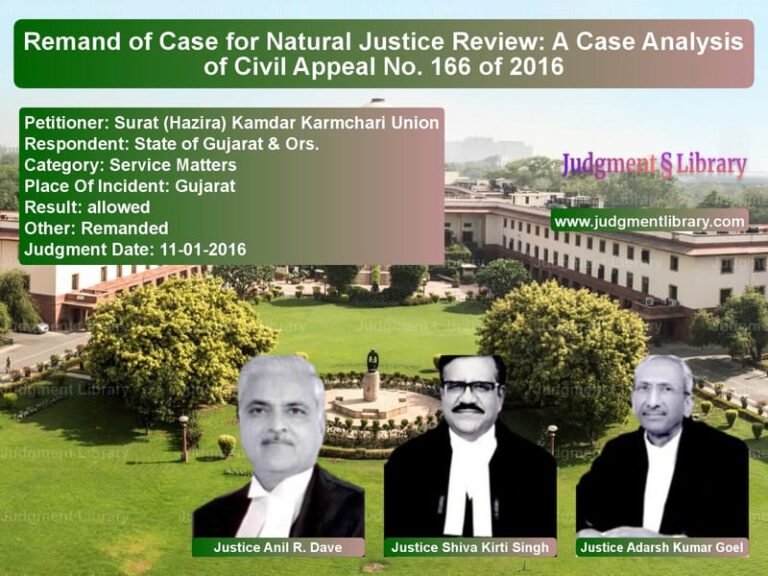Supreme Court Rules on Taxability of Gutkha and Pan Masala: A Landmark Judgment
The Supreme Court of India recently delivered a significant ruling on the taxability of gutkha and pan masala under state tax laws. The appeals, led by M/S Trimurthi Fragrances (P) Ltd. and others, challenged the power of state legislatures to impose sales tax on these products, arguing that taxation of such goods was exclusively under the purview of central laws. The ruling examined whether state governments could levy taxes on gutkha and pan masala in light of the Additional Duties of Excise (ADE) Act and relevant provisions of the Central Sales Tax (CST) Act.
Background of the Case
The appellants, including manufacturers and distributors of gutkha and pan masala, contended that state legislatures were not empowered to impose sales tax on these products, as they were already subject to additional duties of excise levied by the central government. They argued that under Section 14(ix) of the CST Act, tobacco and tobacco products were classified as ‘special goods’ and should be taxed uniformly across the country. The challenge arose from multiple state laws, including the Delhi Sales Tax Act, Tamil Nadu General Sales Tax Act, and Uttar Pradesh Trade Tax Act.
The core issue revolved around whether gutkha and pan masala could be considered ‘tobacco’ under the law and whether their inclusion in state tax schedules violated constitutional and statutory provisions.
Arguments Presented
Petitioners’ Arguments
The petitioners, led by senior counsel Mr. Dhruv Agarwal, argued:
- Gutkha and pan masala containing tobacco should be classified as ‘tobacco’ under the CET Act and should therefore be exempt from state taxes.
- The CST Act limits state taxation on goods classified as ‘special importance’ commodities, and gutkha falls within this category.
- The changes made to the CET Act through Finance Acts in 1988, 1995, and 2001 should not affect the classification under the CST Act unless explicitly amended.
- State governments exceeded their constitutional authority by imposing additional sales tax on gutkha and pan masala.
Respondents’ Arguments
The respondents, represented by Additional Solicitor General Mr. N. Venkatraman, countered:
- Gutkha and pan masala are distinct from raw tobacco and are classified under different headings in the Central Excise Tariff Act.
- The CST Act’s list of declared goods does not include gutkha or pan masala.
- State legislatures have the power to levy sales tax on products that are not exclusively listed as ‘declared goods’ under Section 14 of the CST Act.
- The classification of gutkha as ‘tobacco’ under the CET Act does not automatically exempt it from state taxation.
Supreme Court’s Judgment
After considering the arguments and precedents, the Supreme Court upheld the authority of state governments to impose sales tax on gutkha and pan masala. The key observations of the court included:
- “The classification of ‘pan masala containing tobacco’ under the Central Excise Tariff Act does not imply that it is the same as ‘tobacco’ for the purpose of state taxation.”
- “Entry 2404.49 of the CET Act, which includes ‘Pan Masala containing tobacco,’ is distinct from the general classification of chewing tobacco.”
- “The power of the states to impose taxes on gutkha and pan masala is not curtailed by the provisions of the ADE Act or the CST Act.”
- “There is no conflict between state laws imposing sales tax on these products and the central taxation regime.”
Implications of the Judgment
The ruling clarifies that state governments retain their authority to tax products like gutkha and pan masala, even if they contain tobacco. The decision also highlights the distinction between raw tobacco and processed tobacco products, reinforcing the states’ legislative competence in taxation matters.
Read also: https://judgmentlibrary.com/supreme-court-orders-fresh-decision-in-income-tax-settlement-case/
Additionally, the judgment serves as a precedent for future tax disputes involving products that contain ingredients classified under different tax schedules. It reaffirms the principle that unless explicitly exempted, state governments can impose sales tax on goods within their jurisdiction.
Conclusion
The Supreme Court’s decision in this case is a landmark ruling in Indian taxation law. It resolves a long-standing dispute over the taxation of gutkha and pan masala, confirming that these products do not enjoy the same tax treatment as unmanufactured tobacco. By upholding the states’ right to levy sales tax on these products, the judgment ensures that revenue collection mechanisms remain intact while preventing legal ambiguities over tax classification.
The ruling also underscores the importance of clear legislative intent in tax laws and the necessity for businesses to comply with state-specific tax regulations. Moving forward, manufacturers and distributors of gutkha and pan masala must align their pricing strategies with the applicable state taxes, ensuring compliance with both central and state taxation frameworks.
Petitioner Name: M/S Trimurthi Fragrances (P) Ltd..Respondent Name: Government of N.C.T of Delhi.Judgment By: Justice S. Ravindra Bhat, Justice Dipankar Datta.Place Of Incident: Delhi, Tamil Nadu, Uttar Pradesh.Judgment Date: 04-05-2023.
Don’t miss out on the full details! Download the complete judgment in PDF format below and gain valuable insights instantly!
Download Judgment: ms-trimurthi-fragra-vs-government-of-n.c.t-supreme-court-of-india-judgment-dated-04-05-2023.pdf
Directly Download Judgment: Directly download this Judgment
See all petitions in GST Law
See all petitions in Tax Evasion Cases
See all petitions in Income Tax Disputes
See all petitions in Banking Regulations
See all petitions in Tax Refund Disputes
See all petitions in Judgment by S Ravindra Bhat
See all petitions in Judgment by Dipankar Datta
See all petitions in dismissed
See all petitions in supreme court of India judgments May 2023
See all petitions in 2023 judgments
See all posts in Taxation and Financial Cases Category
See all allowed petitions in Taxation and Financial Cases Category
See all Dismissed petitions in Taxation and Financial Cases Category
See all partially allowed petitions in Taxation and Financial Cases Category







